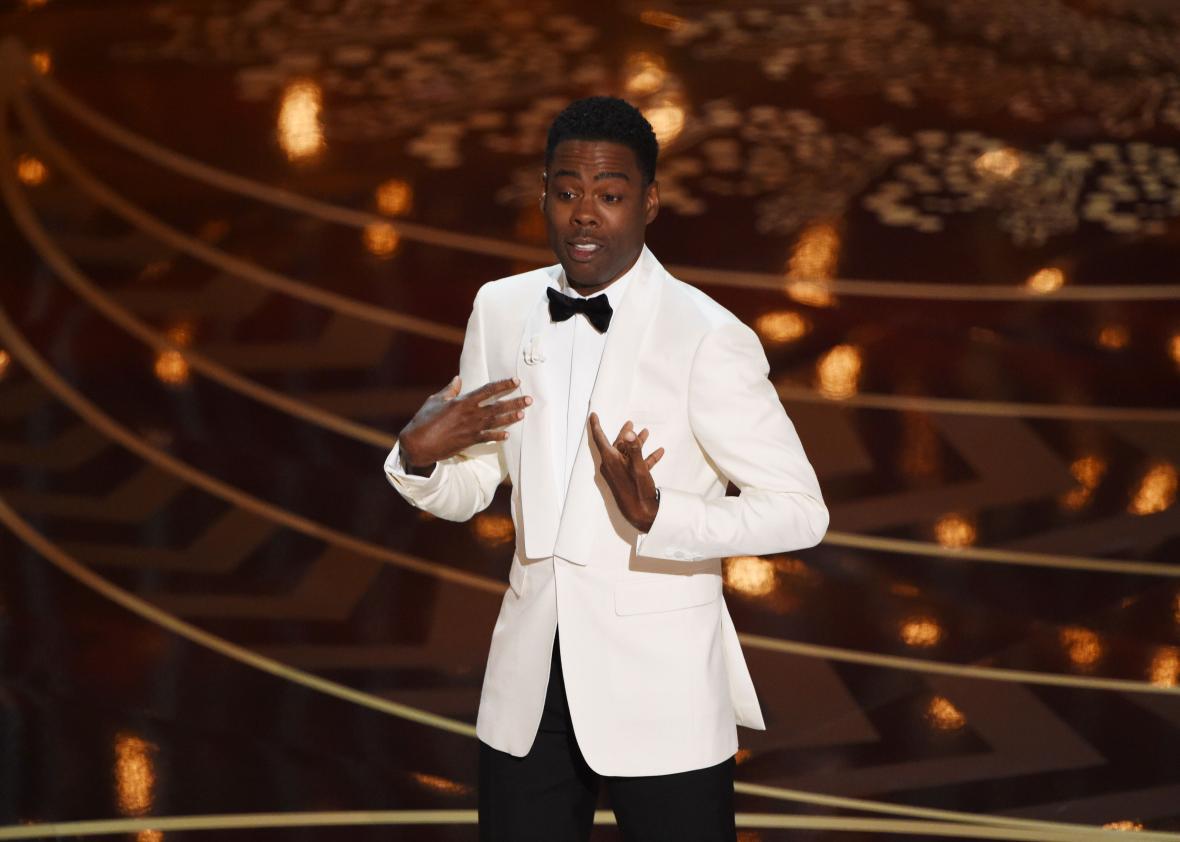For most of the Oscars, Chris Rock proved himself once again to be a dynamic truth-teller about systemic racism, managing not only to make pointed comedy out of #OscarsSoWhite but to keep it front and center long after his biting opening monologue. Then, about two-thirds through, he took a break to make an Asian joke.
It hardly needs to be said that bringing on three Asian kids (one had a Jewish surname; extrapolate as you will) as PricewaterhouseCoopers accountants rested on the lowest of limbs: Asian kids are hard-working and good at math! But Rock then opened what he must have thought was the trap door on the prank: “If anybody’s upset about that joke, just tweet about it on your phone that was also made by these kids.”
The joke here is garbled at best and doubly offensive at worst. It fails as a satire of Asian jokes, because while it flatters Rock to be one step ahead of the audience, it relies on equally base premises: Asian kids are either accountants or child laborers. But is he talking about privileged Asian Americans, raised in graduate-degree households (at least one with a Jewish parent!) now stocking white-collar jobs? Or is he talking about kids from a mostly rural China, whose population is trying to leap into the middle class by soldering circuit boards? He points to the briefcase-toting tots on stage as if they are a single group, when, of course, they are not. And this is the very misapprehension that undergirds every stereotype about Asians: that they are all the same.
Rock’s joke was not even the only one of its kind that night. A little bit later, Sacha Baron Cohen, as Ali G, used nearly the same mechanics to spring another gotcha on the audience:
Here’s the most generous reading: If “hard-working little yellow people with tiny dongs” immediately brings to mind Asians, then the joke’s on you, because he’s really talking about Minions. Both Cohen’s and Rock’s bits rely on a mix of genuine delight and discomfort with their opening gambits. Even if the second beat tries to turn things around, it still allows the teller to make an Asian joke and then excuse himself from the telling. He pulls the rug out from under the audience only to hide underneath it.
These two bits also served as another reminder of how, too often, Asian jokes are the last frontier in cheap racial humor. Last year, I attended a packed Dave Chapelle show at Irving Plaza. He was loose, with little prepared material, and spent a lot of time interacting with the crowd. He pointed out an Asian fan and made a lightly racist joke so generic I can’t even remember it. There may have been sour faces, because he then said “Hey, just so you know, my wife is Asian.” He apparently didn’t realize how close this sounded to “Hey, some of my closest friends are black.” The gestures toward self-awareness that now so often accompany yellow-tinted gags don’t make them any better; they are just reminders of how far we still have to go.
Ultimately, however, what made the Asian jokes at the Oscars such a disappointment was the larger context. After all, this was a night about turning one of our brightest spotlights (no pun intended) on race in America, but as part of, as Rock pointed out in his monologue, a relatively low-stakes affair. What an opportunity, to have this discussion before an enormous viewership, on a night cloaked in a security blanket of celebration. For those who already thrilled to the sight of Beyoncé and her dancers creating an X formation on the playing field of the Super Bowl, this was another level—more expansive, more explicit, with the likelihood not only of lyric but polemic.
The Asian jokes were not just a blip in the night. They were a huge deflation. The black-white dialectic is central to the American experience, and other people of color follow and participate in that dialogue with a fighting interest, and even with understanding when we get sidelined on a night like this. But we don’t expect to be the butt of it.
